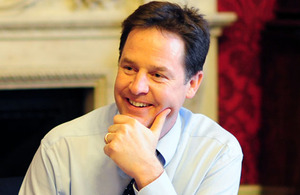Deputy Prime Minister sets out vision for political reform
Local authorities are to be given the power to compare the electoral roll with other publicly available databases.

In speech in Westminster, Deputy Prime Minister Nick Clegg said local authorities are to be given the power to compare the electoral roll with other publicly available databases in order to try to identify eligible voters who have not registered.
Addressing the Political Studies Association and the Hansard Society, Mr Clegg said that pilot “data-matching schemes” will start next year and will be rolled out across the country if they prove a success.
The Deputy PM also explained that while voter registration rates in the UK are relatively good, it is estimated that up 3.5 million people - more than the adult population of Greater Manchester and Birmingham combined - still have not done so.
Nick Clegg said:
It’s true that around 90% of people are registered, and the registration rate does seem to have stabilised after a decline in the last decade, but it is not good enough to simply ignore the millions who aren’t,” he will say, according to an advance extract of his speech.
Especially when you look more closely at where the problem is worst: among the young; among black and ethnic minority communities; in areas with high social deprivation.
The coalition government is clear: these missing millions must be given back their voice.
Mr Clegg also used his speech to highlight the coalition’s plans for more frequent reviews of electoral boundaries, and to tackle electoral fraud by speeding up the introduction of individual - as opposed to household - registration.